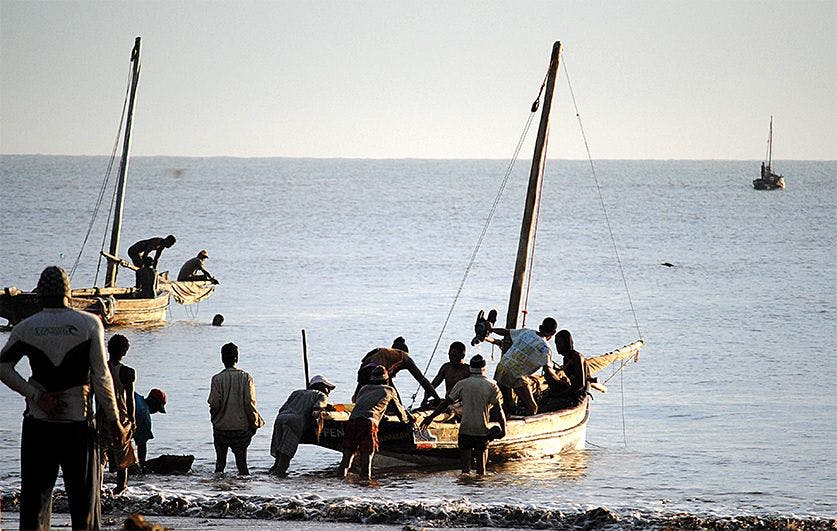
Climate change is a global crisis that is affecting various sectors, including the fishing industry. In Kenya, a country with a significant coastline along the Indian Ocean, the impact of climate change on its marine resources and the livelihood of its fishermen is substantial. This article highlights the inspiring ways Kenyan fishermen are adapting to climate change and turning adversity into opportunities for innovation.
Kenya, located on the eastern coast of Africa, is known for its rich marine biodiversity and vibrant culture. It has a significant coastline along the Indian Ocean, providing an abundant marine environment that supports a thriving fishing industry. However, its location along the equator and the Indian Ocean makes it particularly vulnerable to the effects of climate change. Rising sea levels, warmer ocean temperatures, and increased instances of extreme weather events are significantly impacting the marine ecosystem and consequently, the livelihoods of those who depend on it.
The Effects of Climate Change
The effects of climate change on Kenya's fishing industry are diverse and significant. Changes in ocean temperatures and currents are altering fish migration patterns and causing a decline in fish populations. These alterations are resulting in reduced catch for the fishermen, impacting their income and the food security of their communities. Extreme weather events such as cyclones and floods are damaging fishing gear and infrastructure, adding to the challenges faced by these communities. Furthermore, increased ocean acidification, a side effect of climate change, is leading to the death of coral reefs, which are vital breeding grounds for many species of fish. These changes pose significant challenges to food security and livelihoods in fishing communities.
Adaptation and Innovation
Despite these challenges, Kenyan fishermen are demonstrating remarkable resilience. They are not just standing by and witnessing the climate crisis unfold. Instead, they have embarked on a journey of adaptation and innovation, using their knowledge of the sea and their resourcefulness to find ways to survive and thrive.
They are employing a range of strategies, including the use of climate-resilient fishing gear. This includes the use of fishing nets designed to withstand harsh weather conditions and fish storage equipment that can maintain the quality of their catch in changing temperature conditions. These changes are helping them to continue their fishing activities, even in the face of changing climate conditions.
In addition to adapting their fishing practices, Kenyan fishermen are also diversifying their income sources to reduce their vulnerability to climate change. Some are engaging in aquaculture, farming fish in ponds or cages. This not only provides them with an alternative source of income but also helps to reduce pressure on wild fish populations. Others are venturing into seaweed farming, a sustainable and profitable alternative to fishing. Seaweed is in high demand in various industries, including food, cosmetics, and pharmaceuticals, providing an excellent source of income.
Resource Management Initiatives
Another significant step in their adaptation strategy is participating in resource management initiatives. Fishermen are getting involved in local co-management plans that aim to conserve marine resources and ensure sustainable fishing practices. They are collaborating with local government units, non-government organizations, and research institutions in implementing these plans. These collaborations are helping to improve fish stocks, protect marine ecosystems, and improve the sustainability of their fishing practices.
Role of Education
Education plays a crucial role in these efforts. Fishermen are learning about climate change and its impacts, and how they can alter their practices to mitigate these effects. They are receiving training in new fishing techniques, understanding the importance of resource management, and learning the value of sustainable fishing practices.
The Kenyan government and international organizations are playing a significant role in this educational process. They are providing resources and facilitating workshops and seminars to help fishermen understand and adapt to the realities of climate change. These educational initiatives are empowering fishermen with the knowledge and skills they need to adapt to a changing climate.
Conclusion
The challenges posed by climate change are substantial, but the response of Kenyan fishermen gives us reason for optimism. Their stories of resilience and innovation are a testament to human ingenuity and adaptability in the face of adversity. They are learning, adapting, and finding new ways to survive and thrive in a changing climate.
Their experiences serve as an inspiration for other fishing communities around the world that are grappling with the impacts of climate change. These fishermen show that with creativity, determination, and cooperation, it is possible to adapt and thrive in a changing climate. Their efforts are a reminder that while climate change is a global problem, solutions can be local and that individuals and communities have the power to make a difference.